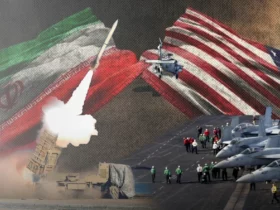The Israeli Foreign Ministry confirmed that the Chinese Ambassador to Israel Du Wei was found dead on the morning of May 17 at his home in Tel Aviv. The forensic team that examined the cause of death found that he died in a dream from sudden cardiac arrest on the night of Sunday. However, sending the body to Beijing has been difficult due to the lack of flights between Israel and China during the Coronavirus Pandemic.
Du Wei has headed the Chinese Embassy in Israel since February. Prior to that, he served for three years as China’s Ambassador to Ukraine.
An odd coincidence
The Chinese ambassador was found dead a few days after US Secretary of State Mike Pompeo visited Israel. It is indicative that the visit was not about the situation in the Middle East, but about Israeli-American ties and relations between Israel and China. On Wednesday, the head of American diplomacy opposed the expansion of Chinese investments in Israel.
After Pompeo’s visit, the Chinese expressed confidence that their friendship with Israel would win and criticized Pompeo’s speech. And then the Chinese ambassador was later found dead.
Conspiracy theories have spread on social networks across Israel, as the Jerusalem Post notes. The death has been associated with Du Wei’s activities in Ukraine, it was assumed that he died of coronavirus and even that the Chinese allegedly covered their tracks. However, the US is the only country that stands to benefit.
China has announced it will send its experts to Israel to investigate the Ambassador’s death. The strange death casts a shadow over Israeli-Chinese relations, especially if information emerges that the diplomat’s death was not accidental.
Last week Pompeo flew to Israel in an attempt to pursue the Israelis not to trade or invest with China. Pompeo wanted the Israelis to limit their consumption of Chinese goods.
Today the Chinese ambassador to Israel Du Wei was found dead in his home in Tel Aviv.
Pure coincidence
— Hadi (@HadiNasrallah) May 17, 2020
Convergence with China
In October 2019, Chinese Vice President Wang Qishan paid a visit to Israel. China makes no secret of its intention to bring Israel into the Belt and Road Initiative (BRI).
Last year, Pompeo threatened to reduce “intelligence sharing and co-location of security facilities” if Israel does not reduce its economic cooperation with China. Former US national security advisor to the president John Bolton – a neoconservative and deep supporter of Israel – also demanded that Tel Aviv refuse to cooperate with ZTE and Huawei.
Late last year, China won a confrontation with the United States over the exploitation of the port of Haifa, Israel’s main harbor in the Eastern Mediterranean.
According to the terms of the tender, the Haifa seaport will belong to Shanghai International Port Group SIPG for 25 years starting from 2021 as compensation for the port modernization.
The United States has serious security concerns in this regard and warns that in this scenario Israel may no longer count on close cooperation with the US Navy’s Sixth Fleet, for which Haifa has been a connecting point for many years.
At the same time, it is clear that the US would not want to lose a convenient harbor. There are not many harbors in the Eastern Mediterranean that Americans could use, given worsening relations with Turkey.
Americans are alarmed by the activities of Chinese companies not only in the port of Haifa but also in the port of Ashdod, as well as in the construction of a light rail tram in Tel Aviv and car tunnels in Mount Carmel.
In May 2019, the United States began to actively warn Israel against the participation of Chinese company Hutchison Whampoa in the construction of a new desalination plant “Sorek-2” in the Palmachim area.
This plant will produce 200 million cubic meters of freshwater per year, meets a quarter of Israel’s needs and will be the world’s largest enterprise of its kind. Israel is holding a tender for the construction and management of the Sorek-2 plant, which will cost 5 billion shekels.
One of the bidders in the final stage of the tender is a subsidiary of the Chinese holding company, headquartered in Hong Kong.
US Fears
From 1992 to 2017, bilateral trade between Israel and China rose from $50 million to $13.1 billion, making China the Jewish state’s largest trading partner in Asia and the third largest partner in the world after the European Union and the United States.
In August 2019, the Pentagon warned against increasing Chinese investment in strategically important infrastructure projects in Israel. According to defense officials, China’s excessive investments threaten the national security of the US Middle Eastern ally.
According to American experts, the Chinese may be able to track the movement and service of American ships thanks to Israel. China’s presence allegedly poses a threat to cybersecurity as well.
New weapons are being tested in the Palmachim area, where a new water desalination plant will be established. In addition, the US fears the arrival of Chinese capital in the Israeli defense industry. Israeli companies are working closely with the Americans, and the US fears that China could gain access to important military technologies through Israel.
According to Foreign Policy, Chinese investors are now interested in several major arms exporters from Israel – Israel Aerospace Industries, Rafael and Elbit Systems. The first two are state-owned corporations, but what all three names have in common is that they have “daughters” in the United States, who are also involved in the development of modern weapons.
In general, with the US increasing pressure on China to withdraw its production, Israel may become a Chinese window to the world of high technologies, including American ones. At present, China has an advantage over the US in terms of possessing a powerful production base, but has not yet achieved full technology self-sufficiency.
The possibility of connecting to American technologies levels out the US’ technological advantage. China can combine its strong production base and technology, dodging its economic and defense potential in the fight against the United States for the future of the world order.
As the Pentagon and CIA-related think-tank RAND noted:
“Some Israeli, particularly in the Prime Minister’s Office and the Foreign Ministry, have implicitly suggested that they might be willing to ease the restrictions on dual-use and defense technology to China that were established in the mid-2000s. Notably, the Israeli Ministry of Defense (MOD) has resisted these, reportedly because of the Israeli defense relationship with the United States”.
Interestingly, when Du Wei was China’s Ambassador to Ukraine, the Americans accused China of exporting military technology from it, Bolton announced last year.
Bolton’s statement came after the media reported that the US wants to prevent Chinese investors from selling assets of the Ukrainian factory Motor Sich, which produces engines for planes and helicopters. It is interesting that the ambassador, who supervised the Ukrainian direction, went to work in Israel while the US was afraid of leakage of defense technologies from both countries to China.
Reasons for escalation
The active strengthening of the PRC’s position in Israel has been on-going for many years. It has taken place simultaneously with the promotion of Chinese positions in other countries of the region. Thus, according to the Israeli special services cited by Foreign Policy, China’s investments in the Middle East (specific countries are not indicated) increased by 1700% from 2012 to 2017. Chinese investment in the region is currently around $700 billion.
China’s interaction with Saudi Arabia, for example, is indicative. This does not only concern arms deals (e.g., missiles). The “Saudi Vision 2030” programme is not feasible without Chinese investment and technology. At present, Saudi Arabia is China’s number one oil exporter. Last year, Saudi Crown Prince Mohammed bin Salman signed a $28 billion trade agreement with China. This year, the Saudi authorities introduced Chinese as the third language in their schools.
At the same time, China is intensively cooperating with Turkey, Qatar and Iran and opposes the US anti-Iran actions in the region. In other words, China does not divide the states in the region into “good” and “bad”.
Thus, it is a unique actor for which the peaceful development of the Middle East is actually in its interest, as its economic projects and political ties would be jeopardized by chaos.
It is indicative that against the backdrop of China’s increasing role in the Middle East economy and especially with such key US allies as Israel and Saudi Arabia, Donald Trump’s administration took measures last year to aggravate the situation in the region. We might recall that since last spring, the US has been citing operational information about Iran’s insidious plans to send an aircraft carrier group to the Persian Gulf. So it was the US, which deliberately increased tensions with Iran, threatening war. And then, the Saudi oil factory as well as its tankers and those of the United Arabian Emirates were targeted and the US hurried to blame Iran. But what if all this was made not to stop Iran, but prevent Chinese from winning the leadership positions in the region?
Against this background, the US strengthened its military presence in Saudi Arabia and tried to strengthen its position in Israel by making important symbolic concessions: approving the seizure of Palestinian lands and declaring Jerusalem the capital of the Jewish state.
De facto, the US consciously pushed to increase tensions. At the same time, they have done everything to ensure that Iran’s main targets are Saudi Arabia and Israel. By exacerbating tensions, the Americans have achieved the preservation of these countries in their orbit of influence.
China can give all countries in the region money, infrastructure and technology. The only thing the Americans can “sell” to them is weapons and protection from an external enemy. But in order for there to be demand for this in the first place, there must never be peace in the region: relations between all of the countries must balance on the brink of peace and war.
Perhaps that is why the Americans killed Qassem Soleimani, who had a letter on reconciliation addressed to Saudi Arabia. The strange death of the Chinese ambassador to Israel is a new death that sheds light on possible American plans in the region and confrontation between the US and China in the Eastern Mediterranean and the Middle East.

















Leave a Reply